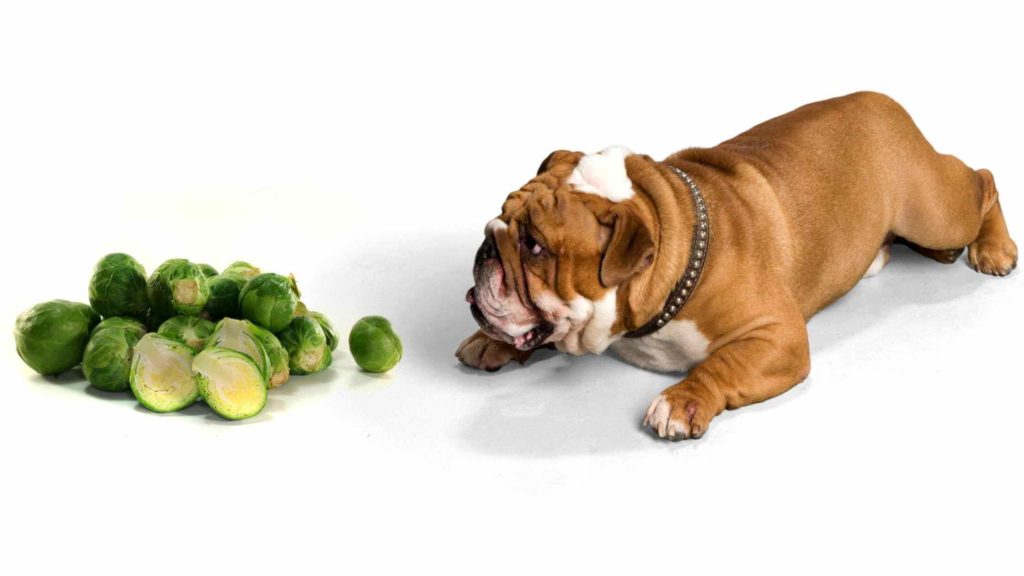As pet parents, we aim to ensure our pets’ well-being in all aspects of their lives, including their diet. You might be wondering if Brussels sprouts are okay for your pet to consume, given their high nutritional value for humans. This post will resolve the secrets surrounding this vegetable and its place in the world of our furry friends. After all, knowing what’s safe and healthy for our pets is just as important as the unconditional love they provide us every day.
So, can dogs have Brussels sprouts? Yes, dogs can consume Brussels sprouts. These little vegetables can be given to dogs as a nutritious treat or meal topping as long as they are prepared properly and in moderation. However, these veggies contain the chemical isothiocyanate, which might cause excessive flatulence in dogs if consumed in excess. Dogs, like people, can develop food sensitivities. Brussels sprouts are normally safe, but it’s a good idea to introduce them gradually and watch your dog’s reaction.
Safety Tips When Giving Your Dog Brussel Sprouts
1. Pick Green Brussels
Pick green Brussels sprouts that are organic (if possible) and don’t have any wilted or brown leaves. Give your dog fresh sprouts because old ones could result in watery stools.
Cut off the stem and wash your Brussels sprouts to get rid of any chemicals or pesticides that can make your dog sick.
2. Feed in moderation
Feeding your dog excess Brussels sprouts can lead to a gassy stomach. You should also introduce it to your dog in small portions to prevent diarrhea and other stomach issues.
3. Proper preparation
Feed cooked Brussels sprouts that are unseasoned in small amounts. Do not include any other ingredients like garlic or onions, oil, salt, or seasonings. Do not give your dog the Brussels sprout stalk since the fibrous, thick stalk may pose a choking hazard or impaction risk in your dog’s body and gastrointestinal tract. Given that many dogs gulp their meal, frozen Brussels sprouts could be a choking hazard. The best option is to give them cooked Brussels sprouts.
4. Watch out for allergies and sensitivities
Dogs can experience individual dietary sensitivities, just like humans do. Even though Brussels sprouts are generally okay to eat, it’s best to introduce them gradually and watch your dog’s reaction.
Your dog’s size will determine how many Brussels sprouts he or she can consume. Larger dogs may consume up to five sprouts, while smaller dogs can manage one without any issues. Consult your veterinarian to find out how much to feed your four-legged friend without causing them foul sprout gas.
Adhere to the 90/10 rule if you feed your dog anything other than their regular dog food. Your dog should consume 90% of its calories from balanced dog food and the remaining 10% from nutritious treats.
Health Benefits Of Giving Brussels Sprouts To Your Dog
1. Dietary fiber
Fiber is essential for preserving the health of your dog’s digestive tract and keeping everything running smoothly. It actively promotes healthy bowel movements for your canine companion.
An insoluble fiber does not dissolve in water. This distinguishing feature enables it to keep its structure as it travels through your dog’s intestines. Interestingly, it can attract water to the stool, which serves two purposes. First, it keeps the feces soft and moist, which makes it easier to pass. Second, while it glides, it serves as a gentle brush, cleaning away any leftover food particles and debris. This natural cleansing process considerably reduces the likelihood of your dog developing digestive issues such as tummy upset, constipation, or diarrhea.
2. Vitamin K
Vitamin K is a crucial component of your dog’s health, as it affects both the blood and the bones. This fat-soluble vitamin contains prothrombin, a protein that aids in blood clotting and contributes to bone metabolism. Additionally, vitamin K aids in controlling blood calcium levels. This specific function is important for lowering the risk of cardiac disorders. Furthermore, vitamin K promotes blood flow throughout the body, maintaining a healthy cardiovascular system.
3. B1 and B6 vitamins
These two vital vitamins, play important roles in increasing your dog’s metabolism. Their job is to aid in the release of energy from the food your dog consumes. They also contribute to the formation of new cells, which is essential for the overall health of your dog.
4. Antioxidants
Antioxidants are abundant in Brussels sprouts. Antioxidants defend the health of your dog by combating the free radicals that result in oxidative cell damage. But they also offer some significant cognitive and age-related advantages.
These potent antioxidants—vitamin C, vitamin A, sulforaphane, kaempferol, and folate—provide anti-inflammatory effects, strengthen your dog’s immune system, and guard against several cancers and heart disease.
Kaempferol: This lowers the danger of developing chronic illnesses like cancer.
Isothiocyanates: These phytonutrients defend against oxidative damage. They can lower the risk of heart disease, cancer, and cognitive aging.
5. Minerals
The vital minerals present in Brussels sprouts are potassium, calcium, and manganese. Their role is to promote the overall integrity, neurological system, muscular function, fluid balance, bone health, and cell function of your dog.
6. Weight loss
Fiber makes your dog’s digestion take longer. This can keep your dog feeling satisfied after meals, which decreases begging and helps them lose weight. For dogs who are overweight or have diabetes, Brussels sprouts are a suitable treat because they have low calories, no sugar, and a high fiber content.
Risks of Feeding Your Dog Brussels Sprouts
1. Can Lead To A Gassy Stomach
Brussels sprouts contain isothiocyanates which aid the intestinal muscles in moving food and waste through the digestive system. However, they also produce too many bacteria, which are microscopic creatures that support the fermentation process of digestion.
These little creatures produce a lot of gas, which is how the body expels extra bacteria. If your dog consumes an excessive amount of Brussels sprouts, you might need to open the windows to get the odorous dog farts out of the house.
2. Can Lead To Chocking And Intestinal Blockage
The stalks of Brussels sprouts are tough and highly fibrous. They may put your dog at risk of choking, as well as causing digestive obstructions or impaction issues. However, if the outer skin of the stalk is removed, it is relatively safe for your dog to consume. The leaves should also be cooked and chopped.
3. Raw Brussel Sprouts Can Cause Bloat
Brussels sprouts that are still raw are difficult to digest. If you offer them to your dog raw, their fiber will be difficult for the digestive system to assimilate. This could result in diarrhea, bloating, or gastrointestinal distress.
Can Puppies Eat Brussels Sprouts?
Normally, it is not advisable to give puppies food that is not part of their regular diet. Like babies, growing pups have distinct nutritional requirements than adult dogs.
Furthermore, their digestive systems are more delicate and susceptible to problems brought on by the human diet. It is preferable to wait until your dog has grown out of the puppy stage before introducing Brussels sprouts to him.
How Often Can Dogs Eat Brussels Sprouts?
To avoid tampering with his digestive tract, try not to feed your dog Brussels sprouts too regularly.
It may be advisable to limit feeding your puppy Brussels sprouts to a few times each week to assist in reducing gas and related discomfort.
Sprouts shouldn’t make up more than 10% of your dog’s diet.
The quantity of Brussels sprouts served to your dog should be determined by its size. Small-breed dogs should only consume one serving per day, medium-breed dogs two to three, and large-breed dogs up to five. However, it is always advisable to feed your dog as per your vet’s advice.
Conclusion
Dogs can have Brussels sprouts since they are not toxic to dogs, however, they should be given in moderation. Brussels sprouts are a great addition to your dog’s dinner dish either served plain, fresh, or cooked. Remember, moderation is key, and always consult your vet.

